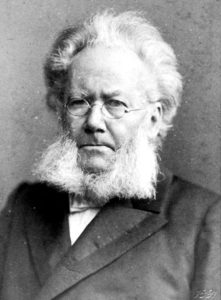
Henrik Ibsen
The doctor’s discovery
In a small Norwegian town, Dr.Tomas Stockmann is a doctor at Kristen Springs, a spa that is popular with the town’s people and outsiders. The spa had been founded by himself and his brother, Peter Stockmann, who is also the Mayor of the town.
At one point, Tomas becomes suspicious of the quality of the water in the spa. He sends a sample of the water for testing and the result is clear: the water of the spa is polluted and is of great danger to the health of all its visitors. Instead of curing them, the spa will make them sick. The water is being polluted by toxic waste discharged upstream into the water source. The culprit is a tannery owned by Kriil, Tomas’ father-in-law. The spa is of great economic and cultural importance to the town, but Tomas is convinced that it must be closed until the fault is corrected. The entire intake system must be redone.
Tomas conveys his discovery to Hovstad and Billing, the editors of the local paper, The People’s Daily Messenger. He also tells them that he would give them an article on his discovery. The editors praise Tomas for his initiative to protect the health of the spa users. They also want to use the article to bring down the Mayor and his corrupt cronies, though Tomas had no such intention.
The opposition
Tomas’ brother Peter is not happy with the developments. He feels that the reconstruction would take two years to complete and cost a lot of money too. That would ruin the town’s economy. Peter asks Tomas to keep his discovery to himself and let the spa continue to operate. Peter, who is also the Chairman of the Spa Board, would get some minor changes made to improve the water quality. Tomas does not agree and the brothers have a serious altercation. Peter tells Aslaksen, the owner of The People’s Daily Messenger (as well as the editors) that, if the reconstruction of the spa is to be done, he would increase the tax on the people. Aslaksen then decides against printing Tomas’ article. He is afraid of losing circulation by advocating a costly reconstruction and a potential tax increase.
An enemy of the people
Tomas stands firm and decides to call a public meeting to disclose his discovery. Due to the machinations of Peter and Alaksen, the entire audience turns against Tomas and does not allow him to speak about the contamination of the water. The people even declare Tomas to be the enemy of the people.
Things get even worse for Tomas. Stones are thrown at his house, his landlord gives an eviction notice, his daughter loses her teaching job, and his sons are attacked in school. Peter threatens to fire him from the spa and have him arrested on a trumped-up charge. Hovstad and Billing offer to help him, but only if he does not release his report. Kriil also does not want his tannery to be named as the polluter.
Standing firm
Tomas is unfazed. He gathers his family around him and says that they would stay and fight. They would begin teaching street kids and thus create the beginnings of a new and just society. As the mob howls outside, a rock comes crashing through the window.
Background: ‘An Enemy of the People’ is a play written by the famous Norwegian playwright Henrik Ibsen (1828 – 1906), who is considered the father of modern drama. I came across the play while writing a book on Ethics. Since I liked the play very much, I have written a short prose version for this post. It is remarkable that Ibsen wrote this play in 1882. The theme and the plot seem so relevant today!
You can read the full play here. A film version was made by George Schaefer in 1978 with Steve McQueen and Bibi Andersson as the lead actors.

I agree, not a thing has changed as on date. On one hand, interested parties continue to play their games for economic gains, no matter how harmful it is to the society. They are the people who are in control of the society at large and they travel to any extent to cover up facts, if their financial and economic interests are jeopardised. They are unwilling to listen to sane thinkers and dub them as insane or damage their interests to drive them towards poverty. This is a human psyche and people go to any extent to usurp power and wealth only for reasons of dictating to the community or the society, no matter how harmful it is.
On the other hand, we also have people (although a minority) to fight for what is right, irrespective of the destruction it does to them. The balance does not tilt in their favour unless the community or the society has to bear the agony of the foolish acts of the powerful and the wealthy.
Yes the theme and the plot is as relevant as it was when the play was written. I can assume that this has always been so.